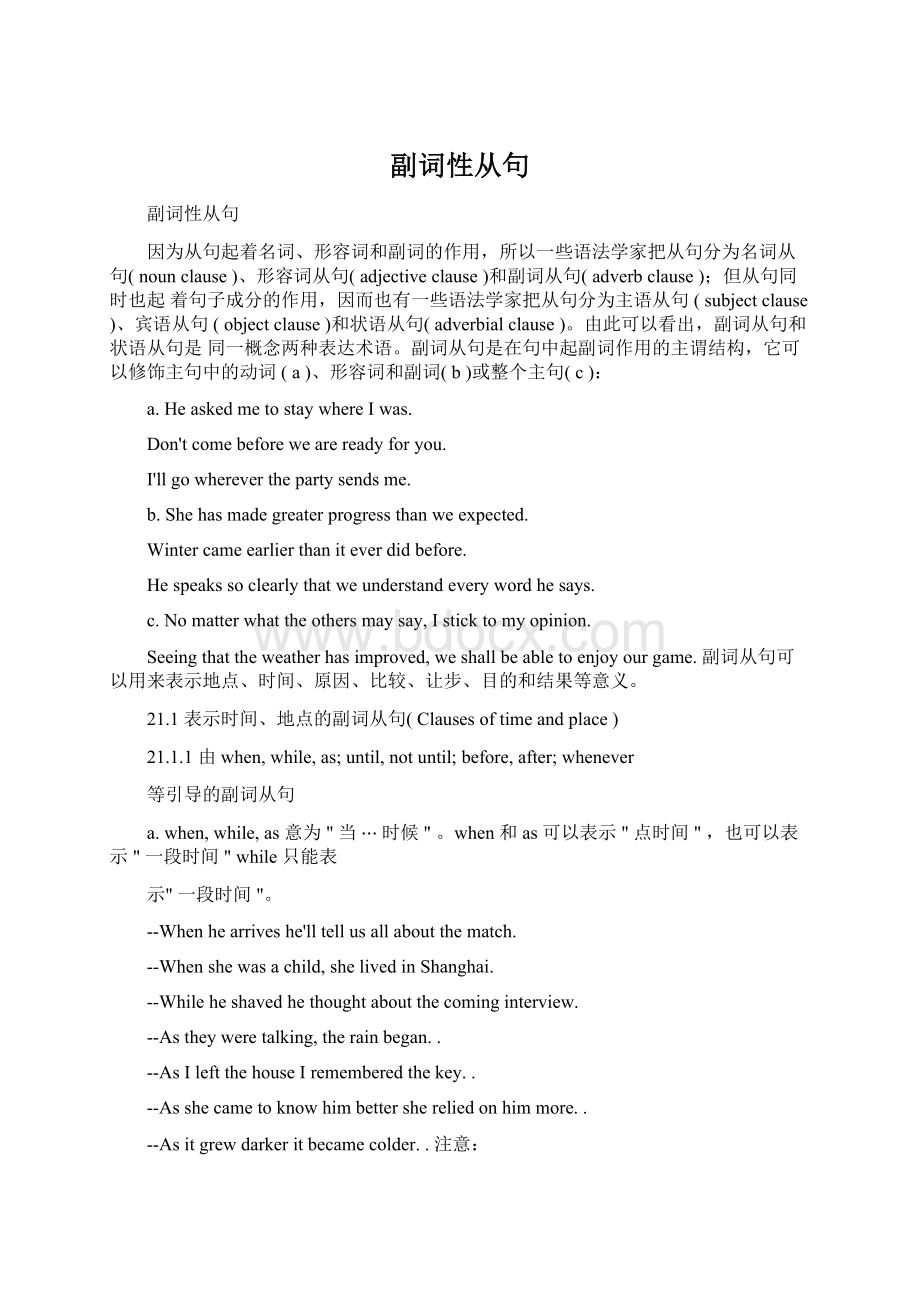副词性从句.docx
《副词性从句.docx》由会员分享,可在线阅读,更多相关《副词性从句.docx(12页珍藏版)》请在冰豆网上搜索。

副词性从句
副词性从句
因为从句起着名词、形容词和副词的作用,所以一些语法学家把从句分为名词从句(nounclause)、形容词从句(adjectiveclause)和副词从句(adverbclause);但从句同时也起着句子成分的作用,因而也有一些语法学家把从句分为主语从句(subjectclause)、宾语从句(objectclause)和状语从句(adverbialclause)。
由此可以看出,副词从句和状语从句是同一概念两种表达术语。
副词从句是在句中起副词作用的主谓结构,它可以修饰主句中的动词(a)、形容词和副词(b)或整个主句(c):
a.HeaskedmetostaywhereIwas.
Don'tcomebeforewearereadyforyou.
I'llgowhereverthepartysendsme.
b.Shehasmadegreaterprogressthanweexpected.
Wintercameearlierthaniteverdidbefore.
Hespeakssoclearlythatweunderstandeverywordhesays.
c.Nomatterwhattheothersmaysay,Isticktomyopinion.
Seeingthattheweatherhasimproved,weshallbeabletoenjoyourgame.副词从句可以用来表示地点、时间、原因、比较、让步、目的和结果等意义。
21.1表示时间、地点的副词从句(Clausesoftimeandplace)
21.1.1由when,while,as;until,notuntil;before,after;whenever
等引导的副词从句
a.when,while,as意为"当⋯时候"。
when和as可以表示"点时间",也可以表示"一段时间"while只能表
示"一段时间"。
--Whenhearriveshe'lltellusallaboutthematch.
--Whenshewasachild,shelivedinShanghai.
--Whileheshavedhethoughtaboutthecominginterview.
--Astheyweretalking,therainbegan..
--AsIleftthehouseIrememberedthekey..
--Asshecametoknowhimbettershereliedonhimmore..
--Asitgrewdarkeritbecamecolder..注意:
1.as多用来连接两个逐渐发展或演变的动作或状态。
例如:
Weadvanceinexperienceas
we
advanceinyears.
2.当as意为"当⋯时候"时,主要与表示动作或发展过程的动词连用,一般情况下它不与下列动词连
用:
表示感觉的动词如feel,taste,smell
appreciate(=value),desire,fear,hate
等;表示感情和情绪的动词如等;表示精神活动的动词如:
admire(respect),agree,believe,
mean,know,
recall,remember,suppose,understand
等;表示拥有的动词如belong,own,possess
等。
b.till,until当till和
return,start
until引导的从句在主句后,且主句的谓语动词含有
等一
come,finish,go,reach,
时性动作动词时,主句的谓语用否定形式,即not⋯till(until),其意为"直到⋯才--IaskedPeternottosigntheagreementuntilhehasheardfromus..
--Hedidn'treachthestationuntilafterthetrainhadleft..
remain,stay,wait等时,主句谓语用肯定形式:
--IamafraidIcannotfinishtheworktillhearrives.当主句的谓语是表持续性的动词如:
--I'llstaytillyoucomeback..--Let'swaituntiltherainstops..
--Weranandran,tillIthoughtmyheartwouldburst..在句首时,多用until:
--Untilyoutoldme,Ihadnoideaofit.
--NotuntilIhadreadyourletterdidIunderstandthetruestateofaffairs..--NotuntilhecamebackdidIknowit.
⋯that⋯这"一强调结构中:
notuntil常用于"Itwasnotuntil
--ItwasnotuntilIhadreadyourletterthatIunderstoodthetruestateofaffairs.--ItwasnotuntilhecamebackthatIknewit.
注意:
1.在多数情况下,till和untill可以通用。
2.在till和until所引导的从句中,谓语不可用shall,will或would。
c.before,after
等修饰语修饰,
before和after可以用just,right,immediately,sometime,alongtime以表示精确
的时间。
--Itooktheexaminationayearbeforemybrotherdid..
--Hewasstilltiredevenafterhehadhadeighthoursofsleeping..
--I'lldoitafterIfinishthiswork.
before和after可作介词、副词。
--Hewaskilledinacaraccidentfouryearsaftertheirmarriage.
--Pleasecomebefore5o'clock.
--Inevermethimbefore.
--Letmegoinandyoufollowafter.注意:
before作介词用,在表示时间时,不可接一段时间,须接一特定的点时间。
d.whenever(无论何时)
whenever主要用于引导一个频度状语,表示该情景是重复出现的:
--Itrainswheneverwearecamping.
--Wheneverthatmansays"Totellyouthetruth",Isuspectthathe'sabouttotellalie.
--Wheneverwemetwithdifficulties,theycametohelpus.whenever引导的时间副词从句时常兼有让步的含义,有时让步的意味比时间的意味还强。
例如:
--I'lldiscussitwithyouwheneveryoulike.
--I'dliketoseeyouwheneverit'sconvenient.注意:
在口语中常用everytime代替whenever
--YougetyoungereverytimeIseeyou.
--EverytimeIcatchacold,Ihavepaininmyback.
21.1.2由aslongas,everytime,eachtime,nexttime,lasttime等引导的时间副词从句
aslongas意为"在⋯的时候";everytime意为"每次";eachtime意为"每逢⋯的时候"nexttime意
为"下次";lasttime意为"上次";bythetime意为"在⋯时候以前"。
--YoucanneverenterthishouseaslongasIliveinit.(我住在这里的时候,你永远不许进入这个房子。
)
--Aslongas(=while)Ilive,youwillnotwantforanything.(只要我活在世上,你就不会缺乏任何东西。
)
aslongas引导的从句有很强的条件含义:
--I'mhappyaslongasmychildrenare.
--He'llcontinueworkingsolongashehasthestrength.
--Shesmileseverytimesheseesme.
--Eachtimeshegotintotrouble,shewouldaskmeforhelp.
--I'mgoingtoseehimnexttimehecomestoShanghai.
--HehadimpressedmethewaythefirsttimeImethim.(我第一次碰到他时他就给我这个印象。
)
--Bythetimethealarmwentoff,Iwasawake.
--LasttimeIsawMary,shesaidhewasgoingtoFrance.
21.1.3由once,assoonas,themoment(that),theinstant(that),theminute(that),directly,
immediately,instantly引导的副词从句
该词组引导的副词从句表示主句的动作在从句的动作一瞬间之后。
这组连接词的含义为"
就⋯"。
--Onceyouseeher,youwillfindwhatIsayistrue.
--Onceyouobjecttoaman,everythinghedoesiswrong.
once引导的副词从句同时含有时间和条件意味:
--Onceyouunderstandthisrule,youwillhavenofurtherdifficulty.
=Assoonasyouunderstandthisrule,youwillhavenofurtherdifficulty.
=Ifyouunderstandthisrule,youwillhavenofurtherdifficulty.
--Sheweptaloudassoonassheheardthenews.
--Themomentshesawmeherfacelightedupwithasmile.
--Theinstantheopenedthedoor,adogranin.
--Theminute(that)hesawme,hebegantocry.
--I'llgiveyouananswerimmediatelyI'vefinishedreadingyourfile.
--Instantlythebuttonispressed,themineexplodes.
--Everyonewillseethemisprintdirectlytheypickthebookup.
themoment,theinstant,theminute是名词当连词用,后面可接that,但通常省略;directly,
immediately,instantly是副词当连词用。
21.1.4由since,eversince引导的副词从句
该组副词从句表示主句动作的开始时间,从句中谓语动词通常用一般过去时态,而主句中谓语
动词通常用现在完成时态。
--Ihaven'tseenJohnsincehereturnedfromParis.
--IthasbeenrainingeversinceIcamehome.
--Ithasbeentenyearssincemyfatherlefthome.
--SinceIstartedswimming,Ihavelostfivepounds.
Itis⋯和Ithasbeen⋯可以通用。
例如:
--Itisfiveyearssincehejoinedthearmy.
--Ithasbeenfiveyearssincehejoinedthearmy.
21.1.5由nosooner⋯than,barely/hardly/scarcely⋯whe引n导的副词从句
该组副词从句表示主句的动作发生在从句的动作一瞬间之前。
这组连接词的含义为"一⋯就⋯"。
如果把nosooner,barely,hardly,scarcely置于句首就须用倒装结构。
--Shehadnosoonerheardthenewsthanshefainted.
--Nosoonerhadsheheardthenewsthanshefainted.
--Hehadbarelyarrivedatthestationwhenthetrainbegantoleave.
--Barelyhadhearrivedatthestationwhenthetrainbegantoleave.
--Ihadscarcelycomeinwhenthephonerang.
--ScarcelyhadIcomeinwhenthephonerang.
--Wehadhardlygotintothecountrywhenitbegantorain.
--Hardlyhadwegotintothecountrywhenitbegantorain.
注意:
在这组句型中,主句的谓语动词通常用过去完成式,而副词从句的动词通常用过去式。
21.1.6由where,wherever引导的表示地点的副词从句
--Wherethereisnorain,farmingisdifficultorpossible.
--Wewillmeetwhereverthecommitteedecides.
--Shefollowshimwhereverhegoes.
wherever引导的从句有时具有很强的让步含义,特别是当wherever引导的从句放在主句前,而且谓
语动词有may或might等情态动词时。
--Whereveryoumaygo,hewillnotforgetyou.
everywhere(that)和anywhere(that)也可以引导表示地点的副词从句,其功能和意义和wherever相
近。
--Everywheretheyappearedtherewereovations.
(无论走到哪里,他们都受到热烈欢迎。
)
--EverywhereIgo,Ifindthesamething.
--Youmaygoanywhereyoulike.
注意:
地点副词从句可以放在主句的前面或后面。
放在主句前面时,常用逗号把它同主句隔开;如放在
主句后,就不用逗号隔开。
21.2
)|21.1
表示原因、目的和结果的副词从句(Clausesofcause,purposeandresult
21.3|top|
21.2.1because,since,as
其中because语气最强
because,since,as是引导表示原因的副词从句最常用的三个词,since次
之,as语气最弱。
a.because从句通常置于主句之后,强调直接原因;有时也可置于主句之前。
--Hewasangrybecausewewerelate..
--Thefuseblewbecausewehaveoverloadedthecircuit.
--Becauseitwastoodarktogoon,wecampedthere.
--Becausehewantsustomakerapidprogress,theteacherisstrictwithus.
b.可以用否定词not和并列连词but形成并列because从句:
--I'mgoingonatriptomorrow,becauseIhaveto,notbecauseIwantto.
--Hestole,notbecausehewantedthemoneybutbecauseheliked.(他偷东西,并不是因为他想要钱,而是他有这种毛病。
)
c.在强调原因分句时,只能用because从句,而不能用since从句或as从句:
--Itwasbecausehewasillthathedidn'tgowithus.
--Itisbecausehehasbehavedsobadlythathemustbepunished.注意:
1.在回答以疑问词why开头的问句时,只能用because而不能用since或as。
2.并列连词for从句表示因果关系时,可以和because交替使用。
--couldnothaveseenme,for/becauseIwasnotthere.
所不同的只是because从句的位置可前可后,而for从句只能后置。
because
当for从句不表示因果关系,而只是对前面主句的内容加以解释或推断时,这时,不能代替
for。
--Itrainedlastnight,forthegroundiswetthismorning.
d.由as或since引导的原因副词从句,只是附带说明主句的内容,它通常位于主句之前,但有时也可
置于主句之后。
--Ashewassuchafool,Irefusedtolistentohim.
--Asthesoupwasverysalty,wewerethirstyafterwards
(因为这汤很咸,后来我们渴得厉害。
)
--Astherewasverylittlesupport,thestrikewasnotsuccessful.
--Ileftthepartyat10p.m.asIhadtogetupearlythenextday.
由于since表示的原因,指的是讲话者和听话者已知的事实,since除有"因为"意义外,还含有"既然"
之意。
--Sincehecan'tanswerthequestion,you'dbetterasksomeoneelse.
--Sincenooneisagainstit,wewilladopttheproposal..
--Sinceyoucan'ttypetheletteryourself,you'llhavetoaskSusantodoitforyou..
--Hecan'tbeverytired,sincehehaswalkedonlyhalfamile.
21.2.2由now(that)(因为,既然),seeingthat(因为,鉴于),consideringthat考虑
到),inthat(因为)引导的表原因的副词从句
--Now(that)youareabigboy,youmustbehavebetter.
(既然你是个大孩子了,你的行为必须检点些。
)
--Now(that)youhavefinishedthework,youarefreetodowhatyoulike.
--Seeingthatitisraininghardtonight,wewillhavetostayhereforthenight.
--Seeingthatitseemsasifitwillrainsoon,wehadbetterleavenow.
--Consideringthatheisaboy,Iforgivehisbadmanners.
--Hedidpoorlyinhisexaminations,consideringthathehadstudiedhardforthem.
--Mendifferfrombrutesinthattheycanthinkandspeak.(人与兽类的区别在于人能思维和讲话。
)
--Thespeechisallthemoreimportantinthatitwasmadebyamanofauthority.注意:
1.在口语里常把nowthat中的that省去,这时now与表示原因的as和since义。
2.now(that)引导的副词从句,时间意义很强时,被看作时间副词从句。
--Nowth